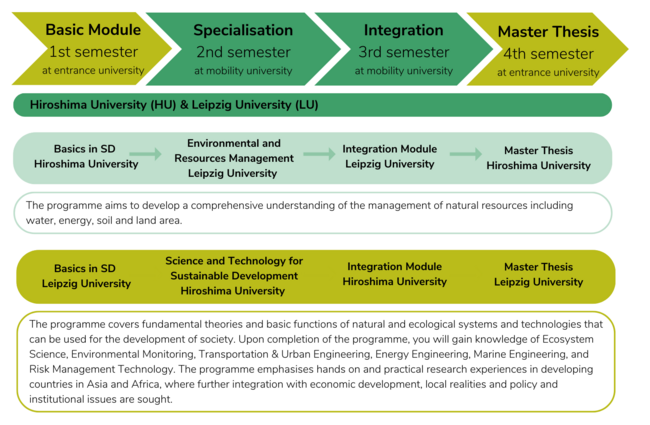Ende dieses Seitenbereichs.
Zur Übersicht der Seitenbereiche.
Beginn des Seitenbereichs: Zusatzinformationen:
Ende dieses Seitenbereichs.
Zur Übersicht der Seitenbereiche.
Study Path: Hiroshima University and Leipzig University
Beginn des Seitenbereichs: Inhalt:
Science and Technology for Sustainable Development (Hiroshima University)
The track Science and Technology for Sustainable Development covers fundamental theories and basic functions of natural and ecological systems and technologies that can be used for the development of society. In particular:
- SDG 6: Clean Water and Sanitation,
- SDG 7: Affordable and Clean Energy,
- SDG 13: Climate Action,
- SDG 14: Life below Sea,
- SDG 15: Life on Land as primary target areas, and
- SDG 9: Industry, Innovation and Infrastructure,
- SDG 11: Sustainable Cities and Communities, and
- SDG 12: Responsible Consumption and Production as secondary target areas.
The track also emphasises hands on and practical research experiences in developing countries in Asia and Africa, where further integration with economic development, local realities and policy and institutional issues are sought.
You will:
- gain basic knowledge on Ecosystem Science, Environment Monitoring, Transportation & Urban Engineering, Energy Engineering, Marine Engineering, and Risk Management Technology;
- be able to identify problems related to science and technology for sustainable development and translate them into a research design in the targeted social contexts;
- be able to propose a scientific and engineering solution based on the research conducted as a part of their Master thesis.
For details see our course guide.
Environmental and Resources Management (Leipzig University)
The track Environmental and Resources Management aims to develop a comprehensive understanding of the management of natural resources including water, energy, soil and land area.
You will:
- understand the fundamental objectives and principles of resources and energy management;
- are familiar with the different legal, policy and economic instruments at the local, national and European levels for the management of natural resources and energy;
- understand characteristic resource conflicts and can apply methods and procedures for their evaluation and prognosis with special attention given to public participation;
- can identify appropriate decision-making criteria for conflict situations;
- possess competences and skills to prepare and bring about complex decisions on the management of natural resources and energy systems and to communicate them.
For details see our course guide.
Ende dieses Seitenbereichs.
Zur Übersicht der Seitenbereiche.
